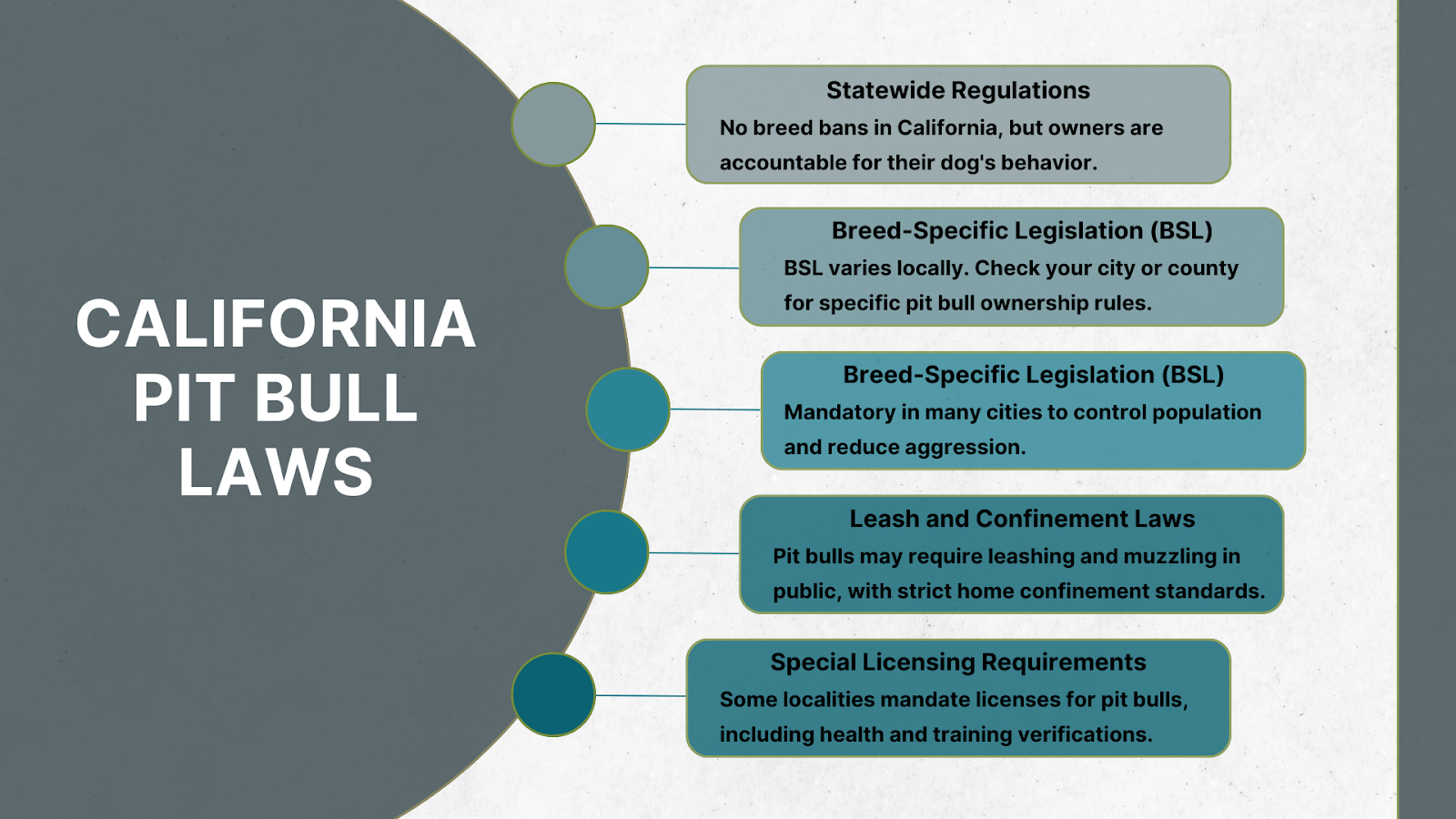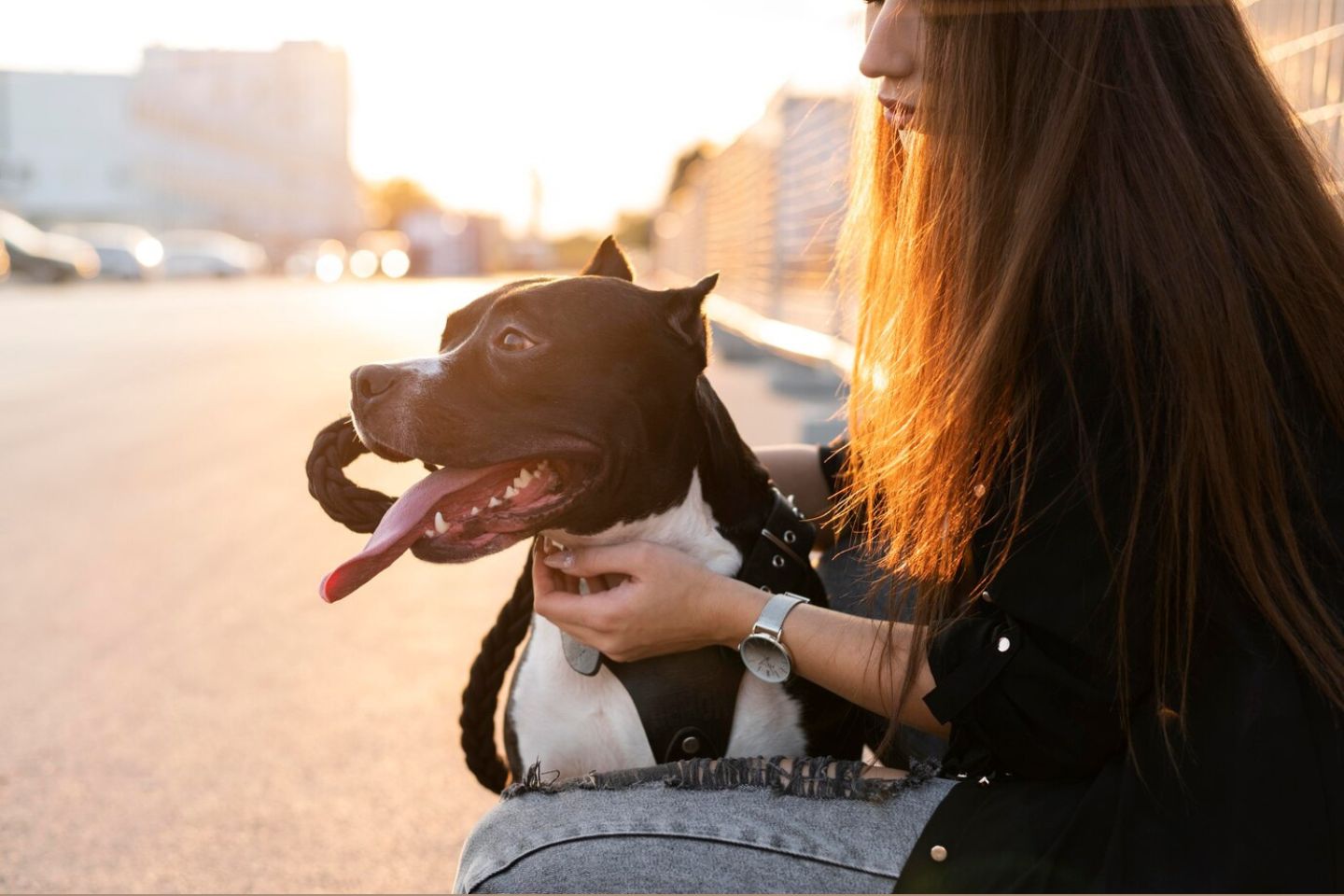In 2022, California reported the highest number of dog attack claims in the United States, with 1,954 incidents representing over 11% of the national total. These figures underscore a growing concern among California residents and dog owners. In a recent and tragic example of these dangers, a man in California was fatally mauled by pit bulls in his own garden.
Given the potential risks, it’s essential for everyone, especially those in close contact with these animals, to be well-informed about their legal rights and responsibilities.
In this article, we’ll provide a thorough overview of California pit bull laws. We aim to offer clear and practical insights into what these laws entail for individuals and communities in California.
Are Pit Bulls Illegal in California?
In California, while there is no statewide ban on pit bulls, local Breed-Specific Legislation (BSL) introduces restrictions for pit bull owners, making it essential to be aware of California pit bull laws at the local level.


Statewide Regulations
In California, no specific breed, including pit bulls, is banned under state law. This means that at the state level, you are legally permitted to own a pit bull. However, state laws emphasize the responsibility of all dog owners for their pets’ actions.
Breed-Specific Legislation (BSL)
In California, this type of legislation is not implemented at the state level but is instead established by individual cities or counties. This means that the rules governing pit bull ownership can vary significantly depending on where you live or plan to move.
Spaying and Neutering Laws
Many Californian cities have implemented laws requiring the mandatory spaying and neutering of pit bulls to help control the breed’s population and potentially reduce aggression.
For example, in San Francisco, the Pit Bull Sterilization Ordinance requires all pit bulls to be spayed or neutered. This law, part of the city’s effort to address public safety concerns, aims to reduce the number of unwanted pit bulls and curb aggressive behavior associated with unaltered dogs.
Leash and Confinement Laws
Several jurisdictions have specific leash and confinement laws for pit bulls. These laws often require that pit bulls be leashed and securely fitted with a muzzle when in public spaces. Confinement laws may dictate the type of fencing or kennels used to secure pit bulls at home, ensuring they cannot easily escape and pose a risk to the public.
Special Licensing Requirements
In some areas, pit bulls are subject to special licensing requirements. These licenses often include conditions such as proof of spaying/neutering, completion of obedience training, or additional fees. The goal is to ensure that pit bull owners are responsible and capable of managing their pets.
Liability and Ownership Responsibilities of Pit Bulls in California


Owning a pit bull in California comes with specific liabilities and responsibilities that are crucial for every owner to understand. These rules are in place not just for the safety of the public but also for the protection of the dog and its owner.
In California, dog owners are held strictly liable if their dog bites someone, regardless of the breed. This is outlined in California’s Civil Code Section 3342, which states that if a dog bites another person in a public place or while the person is lawfully in a private place (including the dog owner’s property), the owner is responsible for the damages suffered by the bite victim.
This law applies to all dogs, including pit bulls, and emphasizes the importance of responsible pet ownership.
The ‘One-Bite’ Rule
In California, the approach to dog bite incidents is governed by strict liability, differing notably from the one-bite rule used in some other states. Under strict liability, dog owners in California are held responsible for most dog bite injuries their pets cause, regardless of the dog’s previous behavior.
This contrasts with the one-bite rule, where owners might not be held liable for the first bite if they had no prior knowledge of the dog’s aggressive tendencies. In California, however, the focus is on protecting victims right from the first incident.
This is particularly relevant for pit bull owners, given the breed’s potential for causing serious harm. Owners are encouraged to be extra vigilant and proactive in preventing any aggressive behavior to avoid liability and ensure public safety.
Responsibilities of Pit Bull Owners
Pit bull owners should be diligent and responsible, following the California pit bull laws to ensure the safety and well-being of their pets and the community. Here are some things responsibilities one must follow:
- Training and Socialization: Proper training and socialization are key to preventing aggressive behavior in pit bulls. Owners should invest time and resources in training their dogs to obey commands and behave well around other people and animals.
- Secure Containment: Ensuring pit bulls are securely contained, especially in outdoor areas, is essential to prevent accidental escapes and potential incidents.
- Compliance with Local Ordinances: Pit bull owners must be aware of and comply with any local Breed-Specific Legislation (BSL) that applies to them, such as mandatory spaying/neutering, muzzling in public, or special licensing requirements.
- Insurance: Insurance: Opting for liability insurance that covers dog bites can be a wise decision for pit bull owners, given the potential severity of injuries these dogs can inflict.
Pit Bull Injuries: Understanding the Risks and Implications
When it comes to pit bulls, it’s important to be aware of the injuries they can inflict. Even though not every pit bull is aggressive, their formidable strength and powerful jaws mean that, in the event of an attack, the injuries can be serious.
Both owners and the general public should understand these risks and their potential consequences.
Pit bull attacks can vary in severity, leading to a range of injuries and potential health complications. These include:
- Deep Puncture Wounds: Pit bulls can cause deep puncture wounds due to their strong bite force.
- Lacerations and Skin Tears: Their bites can result in severe lacerations (deep cuts or tears in the skin) or tearing of the skin.
- Broken Bones: Attacks can lead to fractured or broken bones, particularly in the arms or legs, due to the breed’s power.
- Head and Neck Injuries: In more severe cases, pit bull attacks can cause serious injuries to the head and neck areas.
- Emotional Trauma: Victims of pit bull attacks, especially children, may experience long-lasting emotional trauma and develop a fear of dogs.
- Risk of Infections: Dog bites, including those from pit bulls, can lead to infections. This risk includes bacterial infections such as Pasteurella, MRSA, and Capnocytophaga, which can be serious if not treated promptly.
- Rabies Transmission: Although rare, if the attacking dog is not vaccinated against rabies, there is a risk of rabies transmission, which is a serious viral disease.
- Tetanus: For deep bite wounds, there is a potential risk of tetanus, which requires medical attention.
If you or someone you know has been injured by a pit bull, The Personal Injury Center can offer support. We connect you with experienced personal injury lawyers who specialize in dog bite cases. Our team is here to assist you in seeking compensation for any damages incurred.
What to Do in Case of a Pit Bull Bite?


Being bitten by a pit bull can be a traumatic experience, requiring immediate and appropriate actions for your safety and to uphold your legal rights.
Here’s what you should do if you or someone you know is bitten by a pit bull:
Seek Medical Attention
The first and most important step is to seek medical care. Dog bites, especially from a breed as strong as a pit bull, can lead to severe injuries and pose infection risks. Even if the injury seems minor, a professional medical evaluation is essential.
Documenting the Incident
As soon as possible, document every detail of the incident. This includes taking photographs of the injuries, the location where the bite occurred, and the dog, if it is safe to do so. If there were any witnesses, gather their contact information. This documentation is essential if you decide to pursue legal action, as it will serve as evidence of the incident.
Report the Bite
In California, it’s essential to report a dog bite to local animal control agencies or the police, especially if there’s a continuing risk. These departments are responsible for enforcing animal-related laws, investigating dog bite incidents, and taking necessary actions to prevent future risks.
Call your Insurer
If you have insurance that might cover such incidents, it’s advisable to inform your insurance company about the bite. Depending on your policy, you might have coverage for medical expenses or legal costs associated with the incident. They can also guide how to proceed with any claims.
Filing a Personal Injury Lawsuit
If you have faced a personal injury from a pit bull attack, you have the right to file a lawsuit to seek fair compensation. In California, a legal timeframe exists for initiating a personal injury claim following a dog bite, typically spanning two years from the incident date. Delaying beyond this period may result in losing your chance to pursue compensation. Thus, it’s crucial to consult with a legal professional soon after the event to protect your rights and secure the compensation you’re entitled to for your injuries.
Key Takeaways
|
Seeking Legal Guidance After a Dog Bite? Contact the Personal Injury Center
Have you been affected by a pit bull attack or similar dog-related incident? The Personal Injury Center is here to assist you through this challenging time. We understand the complexities and emotional toll such incidents can take, and our goal is to provide you with the knowledge and support you need.
By reaching out to us, you gain access to a network of specialized attorneys who are well-versed in dog bite cases. We’re dedicated to connecting you with the right legal expert in your area, ensuring you receive the guidance and representation you deserve.



